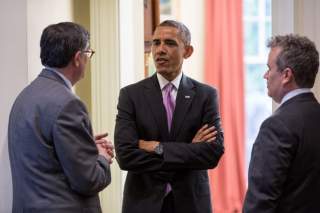Breaking Down Obama’s Big China Win at APEC: It's Not What You Think
The real takeaway from the Obama-Xi meetings at the Asia-Pacific Economic Cooperation (APEC) summit: China has put itself back in the U.S. game.
Let’s be clear, the United States won big this week, but not for the reasons most people think. The media and China analysts have focused overwhelmingly on the climate deal, touting the new commitments from both the United States and China as exceptional, even “historic.” But this is missing the forest for the trees. The real win for U.S. President Barack Obama is keeping China in the tent or, in political science speak, reinforcing Beijing’s commitment to the liberal international order.
To be sure, the climate “deal” is no small deal. The joint announcement—and for the sake of clarity, let’s note that there is no real deal here, just two separate pledges presented together—represents an important step forward for both countries. President Obama has committed the United States to deeper cuts in CO2 emissions than previously put forth, and Chinese President Xi Jinping has promised that China’s emissions will peak around 2030. But it doesn’t get the world where it needs to be with regard to climate change, and many climate experts in both countries appear to agree that much more can and needs to be done by both countries.
The real takeaway from the Obama-Xi meetings at the Asia-Pacific Economic Cooperation (APEC) summit is that China has put itself back in the U.S. game. The entirety of the package—extending visas, establishing rules of the road for maritime and air encounters in the western Pacific, reducing or eliminating tariffs on as many as two hundred information technology goods, and pledging to do more on climate change—is a win for the United States. That doesn’t mean it is not a win for China too; it is. It is just a win that binds China more deeply to U.S.-backed international security, trade, and environmental regimes.
Keeping China in the tent is no small achievement. Over the past two years, since he assumed power, President Xi has pursued a China vision of world order, evincing much more interest in flouting established rules of the road than in buttressing them. He has moved to enforce China’s maritime claims—recognized by no other party—in the East and South China Seas; proposed an Asian Infrastructure Investment Bank that could compete with the World Bank and Asian Development Bank; offered up a new regional security architecture in Asia that would exclude the United States; and initiated an Asia-Pacific–wide free trade agreement that threatens to upend President Obama’s drive to complete the U.S.-backed trade agreement, the Trans-Pacific Partnership (TPP).
The APEC summit does not represent a strategic change for China but a tactical one. Xi is not stepping back from any of his own efforts to establish competing institutions; indeed, he underscored his plans during his joint press conference with President Obama. The U.S.-China relationship will thus continue to be a challenging one underpinned by two competing visions of global order. Nonetheless, the White House can rightly claim a significant win for its China and broader Asia strategy. The pivot has proved its worth; it is here to stay.
This piece appears courtesy of CFR's Asia Unbound blog.
Image: White House Flickr.

